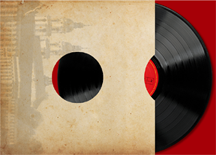Editor's Note - Rev. August 1, 2020
I started out on this project in 2001. My interest in the music of Anton Bruckner dates back over sixty years but that interest was rekindled with my introduction to a group of Bruckner scholars/enthusiasts who correspond via e-mail. At the time, Lani Spahr, one of these enthusiasts and a member of the performing ensemble, Tafelmusik was working on a Bruckner discography that was to help clarify which performing version was being used. At first, I used Lani's discography to help fill in some holes in my collection. At that time, I didn't have the intention of attempting to obtain every performance listed, but I was always looking for Lani's updates. Unfortunately, Lani's interests were shifting to other activities and his lack of updates was beginning to make the task of such an update a larger and larger project. One day, in answer to one of my many queries, Lani suggested that I was the person best suited to continue the project. I think my "gulp" was audible to my neighbors, but it did make sense so thinking I knew what I was getting into, I took the plunge. This discography is an attempt to list every Bruckner orchestral recording offered to the public. This includes commercial recordings, pirate recordings, radio transcriptions that were in general release (i.e. not custom copies), and some limited promotional distributions. We are now including downloads as well (more on this later). Some purely private releases (i.e. copies of a performance made for orchestra members) will be included if I obtain a copy. The rule of thumb here is that if I can obtain a copy, then so can someone else. What I have chosen not to list are private labels. These are labels produced by individuals for their own collection that occasionally get traded to other parties. They are essentially not available to the public and enter into another whole category of aircheck recordings. Some labels in this category are, Gewandhaus (Japan), HeuteMusik (Korea), Red Hedgehog, Dutch Dragon, Charter Oak, etc. New releases and announcements of upcoming releases are displayed in the "New Releases" section. New releases that are re-issues of older recordings will often just show up in the main discography. New recordings will remain in the new releases section until all the data is received - usually when the recording is actually available. A note about the pirate record market and spurious recordings. Unfortunately, they go hand-in-hand. Many of these pirate recordings originate from Japan with names ranging from the evocative "Bells of Saint Florian" to the more bizarre "Rare Moth" and "Lucky Ball." These recordings are very hard to find outside of Japan and they are expensive. For a while, these CDs were always accurate with the provided performance credits, but recently there have been some inaccuracies.. Some of these misrepresentations can be easily unmasked. One runs into wrong dates, wrong orchestras and, yes, even wrong conductors! At first, there seemed to have been some honor among these pirates, but alas, the inevitable has happened and every time a new pirate recording comes in, a lot of comparisons have to be made. Naturally, these pirates love to steal from each other so multiple copies on different labels of the same performance (often misdated) frequently appear. Buying these CDs is becoming a financially risky venture. There are also many "quasi-legal" labels in Europe. Such labels as Melodram, Living Stage, Urania (not to be confused with the Urania of LP days) Classico d'Oro, History, Magic Talent, Archipel, etc. are having a field day with historic performances. These companies are content to work with material that is usually outside of copyright but it makes for a constant stream of re-issues of the same material. They are also not above putting out performances that are off-pitch, extensively altered sonically or supplied with wrong dates and performers. The "best" example of this is the two CD set of "Karajan performances" released by ANF Classics. The Symphony # 4 turns out to be a performance by Kurt Sanderling and the Symphony # 9 is a Jascha Horenstein performance taped off of the BBC. Urania released a Hans Rosbaud performance of the Bruckner Symphony # 8 where a large chunk of the Adagio was carefully and inexplicably edited out. The producer protested that the performance was as it was originally recorded, but the radio archive recording proves otherwise. The name Alfred Scholz may be familiar to some record collectors for his recordings of some light classics, but his activities as a concert producer has left a nightmare for discographers. In the early 70's Scholz brought together a pick-up orchestra primarily made up of musicians from the Czech Philharmonic and the Bamberg Symphony Orchestra for a series of recordings. Scholz christened the orchestra the South German Philharmonic and proceeded to record a large volume of standard repertoire, including performances of several Bruckner symphonies. It is suspected that he conducted a few of these South German Philharmonic recordings but he also used some other conductors - we just don't know who. The result is total confusion. But it gets worse; the Bruckner Symphony # 2 is available in two versions one with the scherzo cut. The false name of Denis Zsoltay is attached to several different performances of the same work. The Scholz-produced recording of the Symphony # 9 has never been issued with the first movement. This recording of the three movement unfinished Ninth Symphony has only been released (on LP, cassette & CD) with movement 3, followed by movement 2, followed by movement 3 again. Lengthy efforts to locate this missing movement have proven fruitless, until recently, since nobody seemed to know who conducted it and which orchestra performed it. For more information on this particular recording, please read my essay on the Scholz Bruckner Ninth in the Articles section. The larger issue of pseudonyms is dealt with in a seperate essay and within the discography itself. When dealing with mass market CDs, errors are bound to happen but pity the poor person who buys the Adventure Classic CD of the Bruckner Symphony # 6. Depending on their knowledge of the composer, they may or may not know that what they are actually hearing is Bruckner's early Symphony in D Minor, commonly referred to as "Die Nullte." Another more subtle example is the Decca Eloquence CD of the Bruckner Symphony # 8 conducted by Georg Solti (Decca 473 474-2). The first pressing states that the recording is with the Chicago Symphony Orchestra but in fact the CD contains his earlier recording with the Vienna Philharmonic. Decca has now corrected the credits on this CD. More information about these CDs can be found on my "Discographic Horrors" page (see column to the left). Another area of growth is the realm of student orchestras. Even before the advent of the CD, Bruckner was a favorite composer for some youth ensembles. With the ease of CD production, these recordings are showing up in increasing numbers. Again, the challenge here is finding out that they exist. Beyond youth orchestras, there are the semi-professional orchestras that are now putting some interesting performances onto CD. Two good examples are a Bruckner Symphony # 4 performed by an orchestra of doctors and one by some patent office workers in Munich! In recent years, symphony orchestras have been producing their own CDs. Some are doing so to sell them to the general public, but some are making limited edition runs that they offer to patrons. A good example of the latter is the Bruckner Symphony # 8 conducted by Guenter Herbig that was produced for the Friends of the Orchestra de la Suisse Romande. Membership in the Friends group would give one access to this CD. Another example is the Gerd Albrecht performance of the Bruckner Symphony # 4 with the Yomiuri Nippon Orchestra of Tokyo. This recording was available to subscribers who renewed their subscription. The new technology of the day is forcing the evolution of the term discography. Once, it was simply a matter of a recording being physically available. Now many organizations are legitimately offering recordings commercially via Internet download. I am including these recordings if they are unique legitimate commercial ventures and are available on a continual basis. So, while a recording offered on the Philadelphia Orchestra website of one of their performances will be listed, a one-week archive recording of a concert broadcast by the BBC will not. Also, offers of downloads of commercially available CDs on third party sites (i.e. Amazon.com, emusic, I-tunes, etc.) will not be listed in that the original recording is (or was) available on a CD or LP. The completeness of this discography is the result of a world-wide effort. Many people offer their time and information to keep this discography up-to-date. A growing list of contributors sends me information and shares their recordings as they are discovered. In turn, I attempt to share commercially un-available recordings with them to increase their knowledge and enjoyment of Bruckner's music while encouraging everyone to purchase the recordings that are made commercially available for us to enjoy. I encourage you to please support these producers with your purchases. Over the past twenty years, this website has grown to be much more than a discography. It has linked up with the Bruckner Society of America and all of its activities and publications. It has also become a source for news, articles, recordings and scores. There is a vast amount of material offered here and I hope that you enjoy it. Please feel free to contact me with any questions or comments. John F. Berky Windsor, Connecticut April 28, 2003 (revised January 16, 2016) | ||||||








